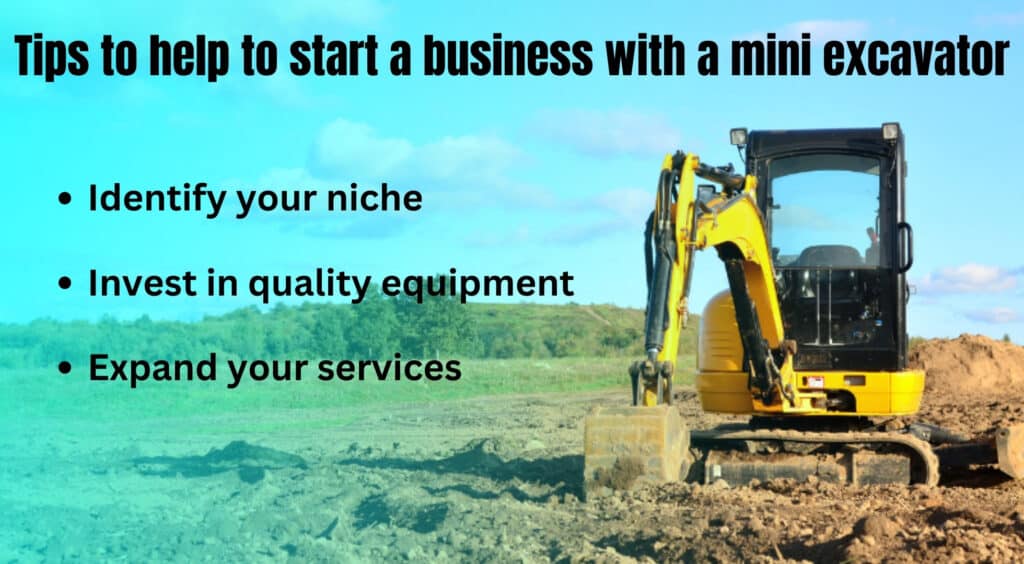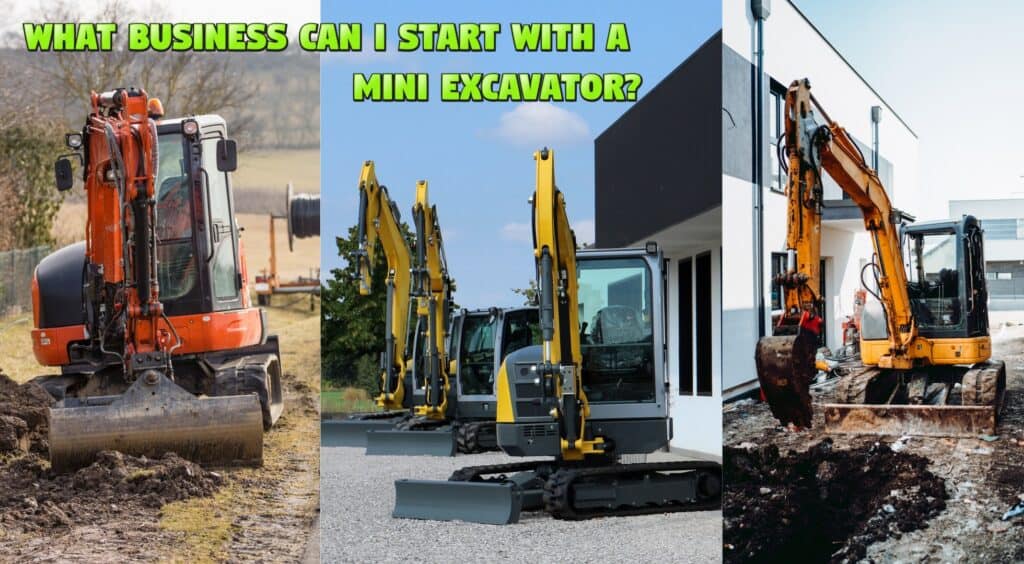Mini excavators have gained popularity due to their efficient digging capabilities. However, many people are unaware of the business of a mini excavator. With the right attachments and coupler system, a mini excavator can perform various tasks, such as excavation increasing profits. Unlike standard excavators, mini excavators are smaller, lighter, and cause less top-ground damage.
They are also easier to handle in congested areas, easily transported between work sites, and have a longer lifespan. Many people purchase mini excavators to avoid hiring costs, ranging from $220 to $520 per day in the United States, depending on location, brand, age, and size.
It’s important to consider rental company charges, rental costs, as well as service and maintenance costs before deciding whether to purchase or rent. If your business requires frequent use of an excavator, owning one can help reduce hiring costs and remove the stress of scheduling hires with companies.
Tips to help to start a business with a mini excavator

Turning your compact excavator into a profit stream requires careful planning and execution.
Identify your niche: Determine the services you want to offer and identify the target market. Research the competition in your area and find ways to differentiate your services.
Invest in quality equipment: A reliable, high-quality compact excavator can help you complete jobs more efficiently and increase your profitability in the long run.
Expand your services: Offer a variety of services to your clients, such as land clearing, grading, trenching, and demolition. It will help you attract more clients and increase your revenue streams.
Profitability in starting a business with a mini excavation and ideas for a mini excavator
With the proper plan and approach, you can start a small excavation firm and mini digger business that is lucrative. Here are some ideas to help you make your excavation business with a mini excavator profitable:
Choose the right equipment.
Choosing the right equipment is essential to the success of a business with a mini excavator. Consider investing in a mini excavator, which is smaller and more affordable than a full-size excavator. It will allow you to tackle smaller projects, reduce costs, and increase efficiency.
Focus on a niche market.
Focusing on a work market can help you stand out from competitors and attract customers who need specialized excavation services. For example, you can specialize in excavation for swimming pools, landscaping, or underground utilities.
Offer additional services:
Additional services such as demolition, grading, and hauling can help you generate additional revenue and increase your customer base.
Build a solid online presence:
It is essential to attract new customers and establish credibility. Develop a professional website, create social media profiles, and list your business in online directories.
Network with other businesses:
Networking with other businesses in the construction and excavation industry can help you build relationships, gain referrals, and expand your customer base.
Provide excellent customer service:
Providing excellent customer service is crucial to building a loyal customer base and generating repeat business. Communicate clearly with customers, deliver projects on time and within budget, and follow up with them after completion.
Monitor your finances:
Monitoring your finances is essential to ensure that your excavation business is profitable. Keep track of your expenses, income, and profit margins, and adjust your pricing and strategies as needed.
Provide excellent customer service:
Respond promptly to customer inquiries, provide accurate quotes, and deliver high-quality work to ensure customer satisfaction and positive reviews.
Hire skilled operators:
Hire skilled and experienced operators who can efficiently operate the equipment and complete the jobs safely and effectively.
Offer maintenance and repair services:
Offer regular maintenance and repair services to your clients to help them keep their equipment in good condition and to generate additional revenue streams.
By implementing these strategies, you can turn your compact excavator into a profitable business and establish a reputation as a reliable and efficient service provider in your area.
Steps involved in Starting a Small Excavation Company

Starting a small excavation company can be lucrative for those who enjoy operating heavy equipment and have a passion for construction.

Develop a business plan:
Determine the type of excavation work you want to specialize in, identify your target market, and develop a marketing strategy. This plan should include financial projections, startup costs, and funding sources.
Obtain necessary licenses and permits:
Contact your state and local government to determine the licenses and permits required to start an excavation company. It may include obtaining a contractor’s license and bonding.
Secure funding:
Determine how much money you need to start your business and consider funding options such as small business loans, grants, or private investors.
Purchase equipment:
Invest in reliable, high-quality excavation equipment such as a mini excavator, backhoe, bulldozer, or skid steer loader. Consider purchasing used equipment to reduce costs.
Hire employees:
Determine the number of employees you need to operate your business and hire experienced operators skilled in using heavy equipment.
Establish a pricing strategy:
Research industry pricing standards and determine a pricing strategy that covers operating costs, labor costs, and profit margins.
Develop a marketing strategy:
Create a website, social media pages, and other marketing materials to promote your business. Attend local construction industry events and network with other contractors to gain visibility and build relationships.
Company Registration
Company registration involves forming a new company and officially recognizing it as a separate legal entity from its owners. Select a name for your company that is unique and not already in use by another business in your area. Check with the relevant authorities to ensure the name is available and complies with regulations.

Now decide on the type of company you want to register, such as a sole proprietorship, partnership, limited liability company (LLC), or corporation, after registering your company with the relevant government agency in your country or state and obtaining a tax ID number, business license, and any necessary permits.
File the necessary paperwork with the government agency to register your company, which may include articles of incorporation, articles of organization, or partnership agreements. Develop bylaws that outline the rules and regulations of your company, such as voting procedures, decision-making processes, and responsibilities of the board of directors.
Open a separate bank account for your company to keep your finances separate from your business finances. Purchase liability insurance and other necessary insurance policies to protect your company from risks and liabilities.
Getting Your Business with a mini excavator Insured
Getting your business insured is an essential step in protecting yourself and your assets from potential risks and liabilities.

Assess your risks: Identify the potential risks and liabilities your business may face, such as property damage, theft, lawsuits, or injuries.
Choose the right insurance: Research the policies that best fit your needs and budget. Common types of insurance for small businesses include general, property, workers’ compensation, and professional liability insurance.
Work with an insurance agent: Find a reputable insurance agent who can help you navigate the complex insurance world and provide tailored advice and solutions.
Obtain multiple quotes: Obtain quotes from multiple insurance companies to ensure you get the best coverage at the best price.
Review your coverage regularly: Review your insurance coverage regularly to ensure it meets your needs and protects you from potential risks and liabilities.
Keep records: Detailed records of your insurance policies, premiums, and claims. It will help you track your coverage and provide evidence in the event of a claim or dispute.
Train your employees: Educate your employees on the importance of safety and risk management to help minimize potential risks and liabilities.
Finding State or Local Government Bodies to Provide Excavation Surety Bonds
An excavation surety bond is insurance that guarantees that an excavator will comply with state or local regulations and laws related to excavation work. Check with your state or local government to determine the bond requirements for excavation work in your area. Each state or locality may have different requirements, such as the bond amount and type required.

Look for a surety bond provider that specializes in excavation bonds. You can search online or ask for referrals from other contractors in your area. Complete the application process with the surety bond provider. You must provide information about your business, such as your name, address, and contact information.
You may also need to provide financial information and proof of insurance. It all depends on your credit score and financial history. Once your application is approved and collateral, you will need to pay the premium for the bond. The premium is a percentage of the bond amount and can vary depending on your credit score and financial history.
Licenses and Permits
Obtaining the necessary licenses and permits is essential in starting an excavation business. Here are some standard licenses and permits that may be required:
Business license: A business license is a permit issued by the state or local government that allows you to operate a business in a specific location.
Contractor’s license: A contractor’s license is needed in most states for anyone who performs construction or excavation work. The requirements for obtaining a contractor’s license vary by state, but generally, you will need to pass an exam and meet specific experience and education requirements.
Excavation permit: An excavation permit is required for any excavation work that exceeds a certain depth or area. The requirements for obtaining an excavation permit vary by state and locality, but generally, you must submit a plan of the excavation work and pay a fee.
Environmental permits: Depending on the nature of the excavation work, you may need to obtain environmental permits from state or federal agencies. For example, if your excavation involves disturbing wetlands or bodies of water, you may need to obtain a permit from the U.S. Army Corps of Engineers.
Right-of-way permits: If your excavation involves digging on public property, such as a sidewalk or roadway, you must obtain a right-of-way permit from the local government agency responsible for overseeing the public property.
Safety permits: Depending on the nature of the excavation work, you may need to obtain safety permits from state or federal agencies. For example, if your excavation involves working near high-voltage power lines, you may need a safety permit from the Occupational Safety and Health Administration (OSHA).
Purchasing Machinery
When starting an excavation business with a mini excavator, purchasing machinery is one of your most essential investments.

Determine your budget:
Excavation machinery can be expensive, so it is essential to determine how much you are willing to spend. Consider not only the cost of the machinery but also maintenance and repair costs.
Research different types of machinery:
Several types of excavation machinery are available, such as mini excavators, backhoes, and skid steer loaders. Research the different types and determine which type will best suit your needs.
Determine the size of machinery you need:
Consider the size of the jobs you will be working on and determine the size of the machinery that will suit those jobs.
Choose a reputable dealer:
Purchase from a reputable dealer that specializes in excavation machinery. Research the dealer’s reputation and read customer reviews to ensure you purchase from a trustworthy source.
Consider used machinery:
Used machinery can be cost-effective, but thoroughly inspect the machinery before purchasing and factor in any necessary repairs.
Attachments: Excavation machinery with various attachments, such as buckets, hammers, and augers. Consider which attachments will be necessary for your specific jobs and factor in the cost of purchasing those attachments.
Pricing Structure for Your Excavation Services
Pricing your excavation services can be a challenging task. You must consider several factors to determine a fair and profitable pricing structure. It would be best if you determined your costs for equipment, labor, materials, and other expenses. Calculate the cost of each project to ensure that you are charging enough to cover your expenses and make a profit.

Research the pricing of other excavation companies in your area. You can do this by calling and requesting a quote for a similar project. The pricing of excavation services can vary depending on the project’s scope. Consider factors such as the size and depth of the excavation, the type of soil, and the accessibility of the site.
Determine your hourly rate by dividing your total costs by the hours you expect to work on a project. Offering package deals for multiple services can significantly increase your revenue and provide more value to your customers.
Marketing Your Excavation Business
Marketing an excavation business requires a strategic approach to reach the right audience and increase brand awareness.

Develop a marketing plan:
Develop a marketing plan outlining your target audience, goals, strategies, and tactics. It will help you stay focused and track your progress.
Build a website, Optimize your website for search engines:
A website is essential to establish an online presence and inform potential customers about your services. Ensure your website is mobile-friendly, easy to navigate, and showcases your work. Optimize your website for search engines by incorporating relevant keywords in your content, meta descriptions, and headings.
Utilize social media:
Utilize social media platforms like Facebook, Twitter, and LinkedIn to promote your business, share updates, and engage with potential customers. Post pictures of your work, testimonials from satisfied customers, and industry news.
Offer promotions and discounts:
Offering promotions and discounts is a great way to attract new customers and generate business. Consider offering a discount for first-time customers or a referral program for existing customers.
Advertise in local media:
Advertise your business in local newspapers, magazines, and online directories to reach potential customers in your area.
Sponsor local events:
Sponsoring local events is a great way to increase brand awareness and build community relationships. Consider sponsoring a local sports team or community event.
The verdict
Starting an excavation business can be profitable but requires careful planning and consideration. Researching the market, obtaining the necessary licenses and permits, securing insurance and surety bonds, and purchasing the appropriate equipment are essential. Pricing your services fairly and competitively is also essential to the success of your business.
Remember to regularly review and adjust your business plan, pricing structure, and marketing strategies to ensure that your excavation business is profitable and sustainable in the long term. Contact us to buy a mini excavator for your new business.

